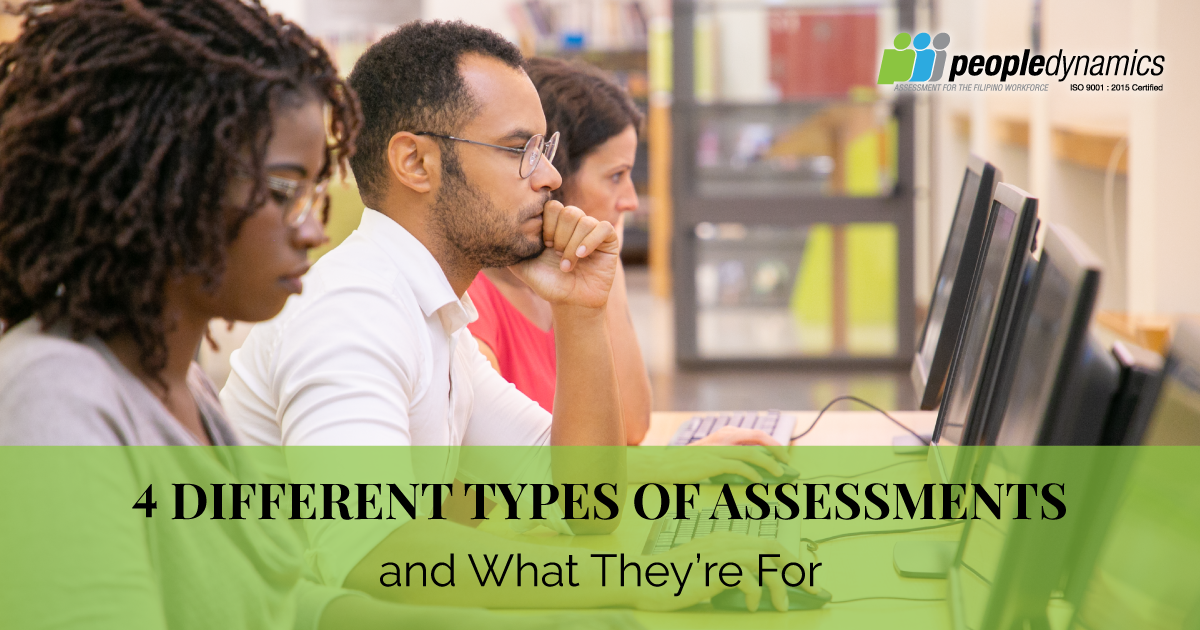Assessments can be a great investment for your organization. But with numerous different types of assessment tools available in the market, deciding which to choose can be confusing. Do you need cognitive or personality tests? What about skills tests? Here’s a guide for the different types of assessments and what they’re for.
The Different Types of Assessments
Cognitive Tests
Many organizations are concerned with the cognitive abilities of a talent. This is where cognitive tests come in. These tests include various forms of IQ tests and measure skills in areas such as vocabulary, word use, numeric ability, and abstract. To filter out unsuitable candidates from your talent pool, you can use cognitive tests.
Personality Tests or Personality Profilers
Personality tests or personality profilers assesses a candidate’s traits and behaviors and profiles them. These tests are important because they can help identify the potential strengths and weaknesses of a candidate and how they will act in certain situations. For example, certain personality types better suit some jobs. Determining your current and future employees’ personality types can also help in having more cohesive teams in the organization.
Some of the most popular personality tests are the following:
- Myer-Briggs Type Indicator® (MBTI) — The MBTI® is based on the conceptual theory proposed by psychiatrist Carl Jung, who had speculated that people experience the world using four principal psychological functions – sensation, intuition, feeling, and thinking – and that one of these four functions is dominant for a person most of the time, with the original versions constructed by two Americans, Katharine Cook Briggs and her daughter Isabel Briggs Myers. The MBTI® has four categories (Introversion/Extraversion, Sensing/Intuition, Thinking/Feeling, Judging/Perception) and has 16 unique personality types.
- DISC Assessment — The DISC assessment is a behavior assessment tool based on the DISC theory of psychologist William Moulton Marston, which centers on four different personality traits which are currently Dominance (D), Influence (I), Steadiness (S), and Conscientiousness (C). This theory was then developed into a behavioral assessment tool by industrial psychologist Walter Vernon Clarke.
Skill Assessment Tests
Different jobs require different skill sets. For a better job fit, you can use skill assessment tests. Using skill assessment tests will help you test the proficiency of a person, whether a current or future employee, in a certain subject that they need for their work. There are also a lot of skill assessment tests out there for your needs. For example, People Dynamics offers skills tests for topics like accounting and finance, language and communication, human resources, sales and marketing, and more.
Integrity Tests
Are you concerned with the work values of your current and future employees? Do you want to prevent hiring or having employees that can show counterproductive behaviors such as theft, violence, sabotage, disciplinary problems, and absenteeism? Integrity tests can help you with that. These assessments measure a person’s basic work-related values such as honesty, trustworthiness, reliability, and work ethics. You can reduce the risk of hiring people with counterproductive behavior tendencies when you use integrity tests.
Things to consider when using different types of assessments
Now that you know what cognitive tests, personality tests, skill assessment tests, and integrity tests do, you might wonder: what is the “best” type of assessment? The answer: none. Appropriately designed and administered assessments will predict a talent’s behavior. Different types serve different purposes. The key is to determine what you need from an assessment.
You may ask yourself these questions:
- What kind of performance do I want to predict?
- What kind of behaviors are you looking for?
- Are there issues important to me and the organization that I need to specifically address?
Once you have determined your needs, you can then start to look for the assessment or assessments that will help you fulfill them. You can also use more than one type of assessment! Just remember: whatever type of assessment tool you are considering, it’s important that it is validated and reliable.
People Dynamics offers various types of assessments that can be customized for your needs. For more information, please contact us through our website, email us at solutions@peopledynamics.ph, or call us at the following numbers: (02) 8 635 0016 / 8 637 8770 / 8 635 9215.




